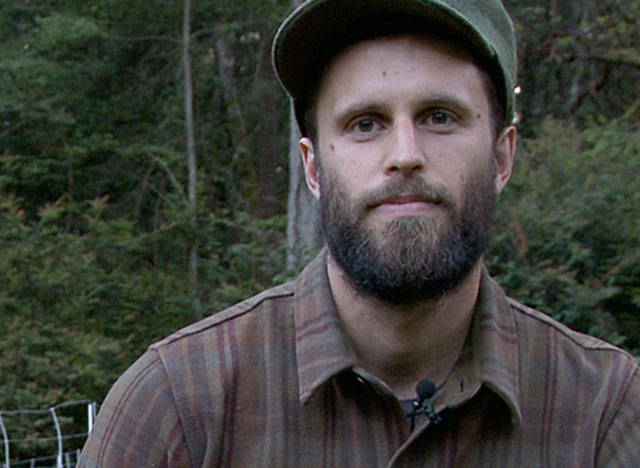A new documentary chronicling the “agrarian renaissance” across the nation, featuring islander Brandon Sheard, will be screened at 1 p.m. Saturday at the Vashon Theatre. The island premier will also feature a panel discussion between Sheard and filmmaker Graham Meriwether.
Narrated by TV host Mike Rowe of Dirty Jobs and the Facebook Watch series Returning The Favor, the film “traces the joys and challenges of farmers and artisans across the country who have embraced the local food movement,” according to a press release.
For his directorial debut, Meriwether examined organic and industrial farming in the film “American Meat.” Weaving together his profile of a livelihood that most Americans have become increasingly out of touch with, he realized that one part of the story was not being told in enough detail.
“I’ve heard again and again that young farmers are having trouble getting started, and that the median age of farmers is 60 years old,” said Meriwether.
While greeting members of the audience after a screening of “American Meat” at Evergreen State College, Meriwether said that Brandon Sheard of Vashon was referenced several times and that he was encouraged to meet him.
“I have just been blown away by his family’s passion and his talent as farmer and homesteader, so it’s been really cool,” said Meriwether.
Meriwether began his career working as a crew member for the TV crime series “The First 48” in 2006. It was not the sort of break into the industry he had hoped for.
“That summer I had a big existential crisis and thought, ‘What am I doing with my life?’” he said, and soon became inspired by the documentary “An Inconvenient Truth,” which had just been released.
“Instead of filming what the worst of humanity could do to each other, I wanted to film the best of what it could do,” said Meriwether, who eventually connected with Sheard for a segment in his latest film, condensing dozens of hours of footage into minutes.
Sheard and his wife Lauren own Farmstead Meatsmith on Vashon, which Meriwether called “one of the coolest farms I’ve ever been to.”
“They go around to different farms, they teach people how to slaughter animals in ways that are very healing and pragmatic,” said Meriwether. “When I filmed with him, that was the first time I had ever seen a pig get shot.” The occasion was included in the film.
“They immediately slaughtered it outside in the woods in a very peaceful setting — it had no idea what hit it — and they captured the blood for blood sausage. Every part of the animal gets used.”
That provision, according to Lauren Sheard, is an essential component of her family’s business model.
“People are, no pun intended, hungry for this lost art and science,” she said. “We’re using natural, humane and, of course, culinarily inclined techniques, making sure we use the whole animal, making sure it’s all delicious.”
Sheard said that Meriwether was attentive to the scope of everything they do, between maintaining their homestead and preparing the animals to be slaughtered in respectful ways that are sensitive to their needs so as not to cause undue harm or stress. Day by day, the family of eight often contends with the unexpected.
“One way to put it is, we’re all building the ship at sea,” said Sheard. “Most of us have not inherited multi-generational farms or centuries-old stewarded estates. That’s not a [common] American inheritance or legacy. I think that goes right down to the roots of the agrarian renaissance, is that we go all in.”
As the adage goes, necessity is the mother of invention. Sheard said the Farmstead Meatsmith operates by conviction first and hopes for the best outcome second.
“We’ve got a mortgage just like everybody else, and especially when you’re running your own small business, you’re just putting one foot in front of the other and hoping that it lands somewhere,” she said, adding that Meriwether’s concept for his film appealed to her and her husband from the onset. While the narrative of large, industrial farms pitted against small, humble ranches like their own continues to polarize farmers in a time when the future of American agriculture is in jeopardy, Sheard said that Meriwether did not make a film that set out to find a villain.
“We really liked that, because it does not demonize anyone,” she said. “Clearly, there’s a problem. We can’t deny that. But we don’t have to ostracize anyone and say, ‘Those people can’t be part of the conversation.’ They do have something to contribute.”
Tickets to attend the screening may be purchased online at bit.ly/2Kx4mK4.
This version of the story corrects the date of the screening, which will show at the Vashon Theater on Saturday at 1 p.m.



